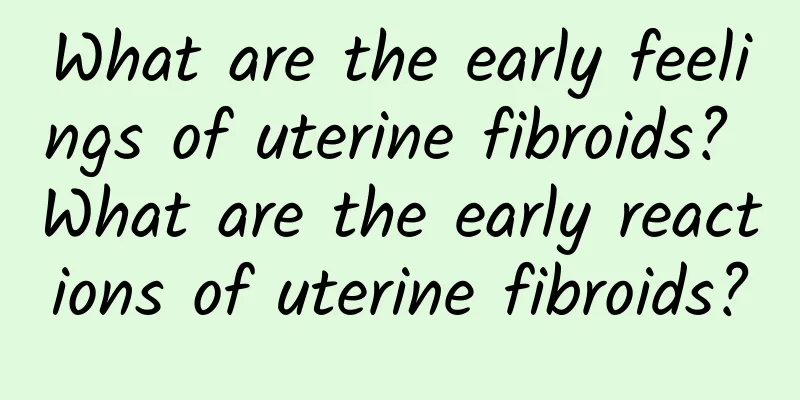What are the early feelings of uterine fibroids? What are the early reactions of uterine fibroids?

|
What are the early feelings of uterine fibroids? What are the early reactions of uterine fibroids? Uterine fibroids are a health problem faced by many women. It is a common female reproductive system disease. However, many women do not know the early symptoms and reactions of uterine fibroids. Below, we will introduce the early symptoms and reactions of uterine fibroids in detail. 1. Cyclic menstrual abnormalities One of the early symptoms of uterine fibroids is cyclical menstrual abnormalities. This means that your menstrual periods may become longer or shorter, and the amount may increase. Sometimes, you may experience pain and discomfort. These are all caused by the presence of fibroids, which increases the thickness of the endometrium, causing changes in the menstrual cycle. 2. Pelvic pain Early symptoms of uterine fibroids also include pelvic pain. This may manifest as persistent, dull or boring pain, and may be aggravated before menstruation, during menstruation or during intercourse. This pain is usually accompanied by the increase and pressure of uterine fibroids, causing some discomfort to women. 3. Bladder and Bowel Compression One of the early symptoms of uterine fibroids is bladder and bowel pressure. Fibroids can grow large enough to press on the nearby bladder and intestines, causing problems such as frequent urination, urgency, pain, constipation, and bloating. This is because the uterine fibroids are pressing on these organs. 4. Infertility or multiple miscarriages For many women who want to have children, the early symptoms of uterine fibroids may cause them confusion and frustration. The presence of uterine fibroids may cause certain obstacles to conception and may even cause multiple miscarriages. This is because fibroids affect embryo implantation and cause pregnancy failure. 5. Low back pain Early symptoms of uterine fibroids also include back pain. As the fibroids grow, they may compress nearby nerves and blood vessels, causing back pain. This pain may be persistent, causing inconvenience to women's daily life and work. In summary, we have mentioned the early symptoms and reactions of uterine fibroids. However, it is inaccurate to judge whether you have uterine fibroids only by these symptoms, because these symptoms may be similar to other gynecological problems. If you suspect that you have uterine fibroids, it is recommended to consult a doctor as soon as possible and undergo relevant examinations. Ultimately, the best way to prevent uterine fibroids is to maintain a healthy lifestyle and have regular medical checkups. Although uterine fibroids are somewhat influenced by genetic factors, a balanced diet, moderate exercise, and reduced mental stress are still very important for preventing their occurrence and development. If you have been diagnosed with uterine fibroids, working with your doctor to develop a reasonable treatment plan will be the first step in your recovery. |
Recommend
How many months should I take the medicine for ovulation bleeding?
How many months should I take the medicine for ov...
What foods should not be eaten for uterine fibroids? What foods are good for uterine fibroids?
Uterine fibroids are a common gynecological disea...
Women should pay attention to the causes of acute adnexitis
Adnexitis is a common gynecological disease. Clin...
How to treat third degree cervical erosion? Physical treatment for third degree cervical erosion
Third degree cervical erosion is also a common co...
Causes and treatments of vaginal candidiasis
Vulvovaginal candidiasis is an old name, now clin...
Will an 8mm uterine fibroid disappear?
If a woman of childbearing age has an 8mm uterine...
A brief discussion on several nursing measures for vulvar leukoplakia
Vulvar leukoplakia is hereditary and very harmful...
The key to successful weight loss is not to give up the food you love
If you want to lose weight successfully, don'...
Let's learn how to regulate menopause? Through these 3 points
Menopause is an important and necessary stage in ...
Women need to pay attention to the dangers of pelvic inflammatory disease
Pelvic inflammatory disease is a common disease a...
What medicine should I take for a 2-centimeter uterine fibroid? Can a 2-centimeter uterine fibroid be eliminated by taking medicine?
What medicine should I take for a 2 cm uterine fi...
How to cure cervical erosion
How to cure cervical erosion? Cervical erosion ge...
Explain some symptoms and characteristics of cervicitis in detail
The most common symptoms of cervicitis need to be...
Say goodbye to stiffness and clicking! 5 stretching exercises to relax
[Key Points]: Regular stretching exercises can he...
Will uterine fibroids affect pregnancy? How big will uterine fibroids affect pregnancy?
Uterine fibroids are a common gynecological tumor...









